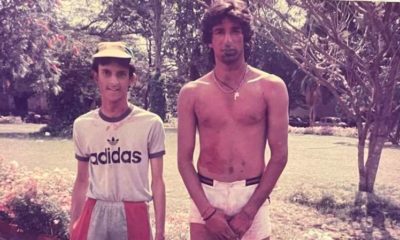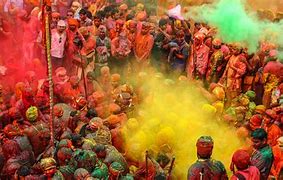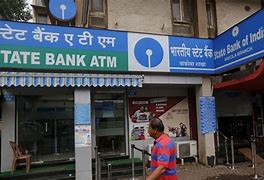National
Choose wisely – go organic this Holi

With Holi -the festival of colours coming up — everyone is busy buying colours, ‘pichkaris’, and balloons but with increasing environment pollution and severe allergic reactions to synthetic colours, there is a growing awareness among people to opt for organic variants.
“In an approximately Rs 4,500-crore unorganised Holi colour market, the share of the organic variety is miniscule, but growing,” said Madhumita Puri, Founder and Executive Director of Avacayam Naturals, a Delhi-based manufacturer of organic colours.
The adverse effects of synthetic colours was observed in a study titled ‘The Holi Dermatoses’, published in the Indian Journal of Dermatology.

It found a spate in skin diseases following the spring festival in India.
In the study conducted on 42 patients in Kolkata, 11 patients suffered due to activities related to preparation of colors and 12 reported aggravation of pre-existing dermatoses.
Nearly 60 per cent patients reported itching, while others reported to have suffered from a burning sensation, scaling, redness and watering of the eyes, as per the study.
Treading on a eco-friendly and skin-friendly path, Avacayam Naturals employed differently-abled persons to make organic colours by using waste and used flowers and leaves.
This solves three purposes at one go – generates employment for the disabled, manufactures harmless eco-friendly colours, and there is optimal usage of waste flowers.
Speaking to IANS, Puri said: “For making the colours, we collect used flowers — roses, marigolds, and others — and leaves from temples, weddings, and hotels.”
Avacayam Naturals, one of the programs that Puri started under her “Trash to Cash” scheme, makes four colours: Pink from roses, yellow from yellow marigolds, orange from orange marigolds, and green from leaves.
On being asked if the colours are harmless, she said: “Rather than damaging the environment, they are beneficial as each packet of colour is made from waste flowers which otherwise would dirty the place.”
How are the colours made?

“After the flowers are collected, the workers sort them in different baskets according to their colour. Then, the petals and seed pods are separated and cut. These are then spread out to dry in a well ventilated space for all the moisture to evaporate.
“After that, they are ground and processed — without adding any chemicals — to be made into colours for people to enjoy,” Puri said, adding that the process of collection, drying, and grinding continues throughout the year but it is only before festivals that they process them into the final product.
“In a year, we manufacture around 20 tonne of pure organic colour, some of which is sold to Walmart India. One kilo of colour is sold between Rs 600 and Rs 1,000.”
When asked about the expiry date of these colours, Puri said: “The product is a dry one and completely natural. We have been testing them since five years now and have not found any deterioration in the quality, fungal infestations, or weevils. So there is no ‘expiry date’ to them.”
Another such manufacturer is Jaipur-based Red Earth which makes colours “exclusively from edible materials and scent them with pure, traditional attars”.
Speaking to IANS, Himanshu Verma, Director-Owner of Red Earth, said: “Every 2-3 years, we change our colour palette… this year we have four colours — Sunahra Dhamaal, Shvet Abeer, Neem Sanrachna, and Gulabi Nagariya — that are inspired by local materials.”
“The colours are curated on the basis of availability of local materials. We use items like camphor, neem, mehendi, multani-mitti, geru powder, arrowroot, flour, and others,” Verma said, adding that 50-60 per cent materials used are edible so that even if someone ingests them by mistake, they will not be as harmful.
National
Foodman Vishal Singh Honored for Hunger Free World Mission in Bangkok

Lucknow: Vishal Singh, a renowned social worker from Lucknow, also known as Foodman, has once again made India proud. He was honored by the Happy Hands Gloves Cooperative Limited Company in Korathai, Thailand, for his work with the Hunger Free World Mission.
The Hunger Free World Mission’s meeting was held in Korathai, Thailand, under Vishal Singh’s leadership. Representatives from several countries, including Mr. Raja Dwivedi (Managing Director of Happy Hands Gloves Limited), Thailand Coordinator Mr. Raja Mishra, and member Mr. Varun Singh, attended the event.

Under Vishal Singh’s leadership, the attendees took a pledge to work together toward creating a hunger-free world.
Speaking on the occasion, Vishal Singh explained that the main goal of the Hunger Free World Mission is social participation. He said the mission is not just about feeding people but also about meeting other basic needs of those who are struggling. The mission focuses on helping families of terminally ill patients in hospitals by providing food and shelter. It also works to fulfill essential needs like education, jobs, and care for the elderly.
For the last 16 years, the Vijay Sri Foundation has been providing free services, benefiting thousands of people. Vishal Singh highlighted that the mission aims to gain global recognition like other organizations such as WHO, WWF, and Red Cross, which work for social causes.
During this meeting, Vishal Singh was appointed as the Chairman of the Hunger Free World Mission by representatives from various countries. They also discussed holding regular meetings in different countries to push the mission forward.
Business tycoon Dr. Abhishek Verma has also supported this humanitarian mission, vowing to promote the idea of “Seva Parmo Dharma” (Service is the highest duty) worldwide. Vishal Singh praised him, stating that people like Dr .Abhishek Verma inspire others to work for the betterment of society.
Recently, Romania’s Ambassador, Mr . Daniela Sezonov Ţane, invited Vishal Singh to the Romanian Embassy in Delhi, where they discussed the mission in detail. Impressed by his humanitarian work, she honored Vishal Singh and invited him to Romania to take the mission forward .
Food man Vishal Singh has been serving the people of India for the past 16 years. Through the Vijay Sri Foundation, he provides free meals to cancer patients & their families ,shelter, and education for women & children along with running free old-age homes in Lucknow.
In addition to his humanitarian work, Vishal Singh also addresses issues like crime and corruption through his role as Chairman of Seva Path Media and Managing Director of Vijay Sri Foundation.

During the COVID-19 pandemic, Vishal Singh and his team worked tirelessly to provide food and help to the needy, including starving children, elderly citizens, and pregnant women. Despite contracting the virus himself, he continued to assist others after his recovery. He even created a life-saving oxygen regulator using household items, which was praised by doctors both in India and abroad.
In his address at the meeting, Vishal Singh spoke about his mission to create a hunger-free world. He pointed out that India’s large population, along with issues like unemployment and poverty, has caused the country to fall on the Hunger Index. He urged people to contribute just one handful of grains daily to help create a hunger-free world.
He concluded by saying that through social participation, we can empower the people around us, meet their basic needs, and work together to build a stronger, more prosperous, and developed society.























